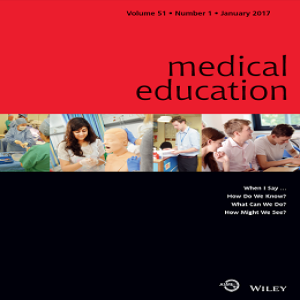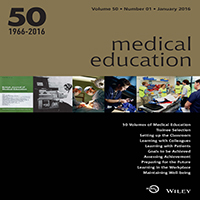Episodes

Monday May 09, 2022
Monday May 09, 2022
By reviewing training strategies, the authors offer practical explanations for what does and doesn't work to support person-centredness, arguing it is critical for us to explain why person-centredness matters.
Read the accompanying article to this podcast: https://onlinelibrary.wiley.com/doi/full/10.1111/medu.14707

Monday Apr 11, 2022
Monday Apr 11, 2022
This study illuminates the dynamic process of student engagement in small-group active learning settings and explains the difficulty teachers have recognizing and influencing engagement in practice.
Read the accompanying article to this podcast: https://onlinelibrary.wiley.com/doi/full/10.1111/medu.14710

Monday Apr 11, 2022
Monday Apr 11, 2022
Van Duin et al. demonstrate that junior doctors learn interprofessional collaboration implicitly, leading to practical implications to help junior doctors become effective team members.
Read the accompanying article to this podcast: https://onlinelibrary.wiley.com/doi/full/10.1111/medu.14711

Friday Apr 01, 2022
Friday Apr 01, 2022
This article demonstrates how residents' beliefs/attitudes affect their interactions with each other. The results suggest effective change can be achieved by small interventions that are easy to implement.
Read the accompanying article to this podcast: https://onlinelibrary.wiley.com/doi/full/10.1111/medu.14706

Friday Apr 01, 2022
Friday Apr 01, 2022
This scoping review outlines doctors' mixed views on the processes used for maintenance of competence and highlights their implications for research and practice.
Read the accompanying article to this podcast: https://onlinelibrary.wiley.com/doi/full/10.1111/medu.14678

Monday Mar 14, 2022
Monday Mar 14, 2022
Using natural language processing, Gin et al demonstrate how narrative feedback and entrustment decisions are intertwined, providing empirical evidence regarding how formative processes can help trainees achieve competencies.
Read the accompanying article to this podcast: https://onlinelibrary.wiley.com/doi/full/10.1111/medu.14696

Monday Mar 14, 2022
Monday Mar 14, 2022
Examiner DRIFT and contrast effects are well established effects in #AssessorCognition but how pronounced are they in real #OSCEs? Yeates et al found muted evidence and discuss why effects may vary between settings.
Read the accompanying article to this podcast: https://onlinelibrary.wiley.com/doi/full/10.1111/medu.14713

Tuesday Mar 01, 2022
Tuesday Mar 01, 2022
The authors demonstrate that how trainees perceive their supervisors to use power influences their trust and their willingness to engage in assessment for learning in the workplace.
Read the accompanying article to this podcast: https://onlinelibrary.wiley.com/doi/full/10.1111/medu.14631

Tuesday Mar 01, 2022
Tuesday Mar 01, 2022
Women students are seen to demonstrate knowledge of “ideal worker norms” very early in medical school; the authors explore how they made sense of norms and began to navigate the gendered organization of their chosen careers.
Read the accompanying article to this podcast: https://onlinelibrary.wiley.com/doi/full/10.1111/medu.14709

Monday Feb 14, 2022
Monday Feb 14, 2022
Stojan et al. explore the role of uncertainty in clinical reasoning and demonstrate how testing and treatment threshold determinations vary with clinical experience.
Read the accompanying article to this podcast: https://onlinelibrary.wiley.com/doi/full/10.1111/medu.14673

